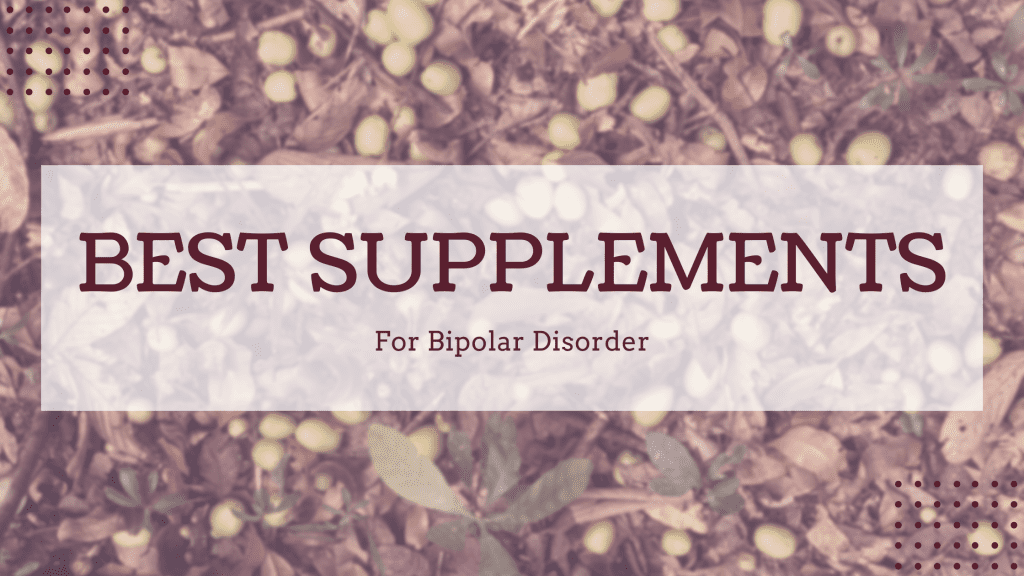Bipolar Disorder Supplements
It's Called a "Supplement" For a Reason
Let’s talk about supplements that help heal bipolar disorder. From the start, we will mention that supplements “supplement” a well-balanced, whole foods diet; good sleep; mindfulness; exercise; and strong support group.
Managing bipolar disorder can be challenging, but many people find that certain supplements can help support their mood, energy, and overall well-being. However, it’s important to work closely with your physician before starting any new bipolar disorder supplement. Your doctor can help you stay safe, check your bloodwork for deficiencies, and make sure supplements won’t negatively interact with your medications.
Many of the vitamins and minerals discussed here are found in everyday foods. But sometimes, your body might need more than you get from diet alone—especially if blood tests show you’re low in something important. In these cases, supplements can help fill the gaps.
Let’s explore some of the most popular supplements for people with bipolar disorder, how they work, and how to use them safely.
For more guidance on bipolar disorder, check out our book and masterclass to reclaim control of your life. You can also check out our free resources.
9 Reliable Supplements
ION Gut Support
Gut health is closely linked to mood and mental health. Dr. Zach Bush, a well-known physician and researcher, has shown that problems in the gut can lead to inflammation, which may cause mood swings and even depression. ION* Gut Support is a natural, soil-derived supplement designed to strengthen the gut lining and support a healthy balance of bacteria in your digestive system. By improving gut health, this supplement may help reduce inflammation and support better mood stability. Many people report feeling more energetic and clear-headed after using ION* Gut Support.
We are not paid by ION to post this recommendation. We genuinely believe in the healing capabilities of this product!
Magnesium
Magnesium is a mineral that helps your body relax, sleep, and keep your mood steady. Many people with bipolar disorder are low in magnesium, which can lead to trouble sleeping and feeling anxious. Mixing one teaspoon of magnesium powder in water about an hour before bedtime can help you relax and sleep better. Always check with your doctor before starting magnesium, especially if you take other medications.
Vitamin D
Vitamin D is known as the “sunshine vitamin” because your body makes it when you’re out in the sun. It helps keep your bones strong and supports your immune system, but it also plays a big role in mood. Studies show that people with low vitamin D levels are more likely to feel depressed. If your bloodwork shows you’re low in vitamin D, your doctor may recommend a supplement to help lift your mood.
Omega-3 Fatty Acids (Fish Oils)
Omega-3 fatty acids are healthy fats found in fish like salmon and sardines. They help your brain work better and can improve mood. Many people with bipolar disorder take fish oil supplements to help with depression and mood swings. Eating fish a few times a week is also a great way to get omega-3s naturally.
B-Vitamins
B-vitamins, including B6, B9 (folate), and B12, are important for your brain and nerves. They help your body make energy and keep your mood balanced. If your bloodwork shows you’re low in any B-vitamins, your doctor may suggest a supplement. Eating foods like leafy greens, beans, and whole grains can also help you get more B-vitamins.
Reishi and Turkey Tail Mushrooms
Reishi mushroom is known for helping with anxiety, gut health, sleep, and energy. Turkey Tail mushroom supports gut health and can strengthen your immune system. Both are available as powders, capsules, or teas. These mushrooms are part of traditional medicine and are becoming more popular for mental health support.
Ashwagandha
Ashwagandha is an herb used in traditional Indian medicine to help the body handle stress. Some people find it helps with anxiety and mood swings. It’s available in capsules, powders, or teas. Talk to your doctor before trying ashwagandha, especially if you take medication for thyroid or blood pressure.
Valerian Root and Herbal Teas
Valerian root is a plant that can help you relax and sleep. It comes in tablets and teas. Chamomile tea is another gentle option that can help you unwind before bed and even help with headaches. Try drinking a cup of chamomile or valerian tea 30 minutes to an hour before bedtime.
Melatonin
Melatonin is a hormone that helps control your sleep cycle. Some people with bipolar disorder use melatonin to help them fall asleep. However, it should be used sparingly—taking too much can make you feel groggy in the morning, and your body can get used to it over time, making it less effective.
Final Thoughts
Supplements can be a helpful part of your bipolar disorder healing plan, but they are not a replacement for medication or therapy. If you are on the tapering journey under the supervision of a doctor, talk to them about using supplements as a way to facilitate recovery and minimize medication withdrawals.
Always talk to your doctor before starting any new supplement, and ask for blood tests to check for deficiencies. By working closely with your physician, you can find the right balance of supplements, food, and medicine to support your mood and overall health1.
Remember: what works for one person may not work for another, so keep track of how you feel and share this information with your healthcare team. With the right support, you can take positive steps toward feeling your best.
For more guidance on bipolar disorder, check out our book and masterclass to reclaim control of your life. You can also check out our free resources.
References:
- https://www.adventhealth.com/hospital/adventhealth-tampa/blog/make-your-doctor-visits-a-positive-experience
- https://www.sebastiansiebertsupplements.com/blogs/news/unveiling-the-antibiotic-depression-nexus-insights-from-zach-bush-md
- https://intelligenceofnature.com/products/gut-health-supplement
- https://zachbushmd.com/ion/
- https://readabilityformulas.com/why-you-should-write-at-an-8th-grade-readership-for-everyday-readers/
- https://quickcreator.io/quthor_blog/how-to-start-a-successful-supplement-blog/
- https://intelligenceofnature.com/blogs/ion/gut-health-and-anxiety
- https://intelligenceofnature.com
- https://lanternco.com/creative-blogging-ideas-for-business/blog-reading-level/
- https://www.nature.com/articles/s41398-024-03207-0
- https://intelligenceofnature.com/pages/restore
- https://proedit.com/how-to-write-for-an-eighth-grade-reading-level/
- https://intelligenceofnature.com/pages/about-ion
- https://pmc.ncbi.nlm.nih.gov/articles/PMC6585963/
- https://www.nature.com/articles/s41398-022-01977-z
- https://zachbushmd.com/shop/
- https://www.youtube.com/watch?v=JIKU7PVhEdU
- https://primediagnosticcentre.com/blog/strategies-to-get-the-best-out-of-a-doctors-consultation/
- https://blog.ohiohealth.com/navigating-dietary-supplements-a-beginners-guide/
- https://www.reddit.com/r/bipolar2/comments/11tz3eg/magnesium_supplement_problem_with_bipolar_disorder/
- https://www.reddit.com/r/bipolar2/comments/17sngfh/vitamin_d_supplementation_is_associated_with_a/
- https://jamanetwork.com/journals/jamapsychiatry/fullarticle/204999
- https://pmc.ncbi.nlm.nih.gov/articles/PMC8613435/
- https://neurolaunch.com/the-potential-benefits-of-reishi-mushroom-for-bipolar-disorder/
- https://healnaturally.com/shop/ion-gut-support-dr-zack-bush/
- https://www.kathysmith.com/episode-13-dr-zach-bush-md-cant-flat-abs-without/
- https://www.mtu.edu/umc/services/websites/writing/readability/
- https://shanesnow.com/research/data-reveals-what-reading-level-you-should-write-at
- https://www.jackelyngill.com/do-you-write-like-an-eighth-grader-chances-are-you-dont/



